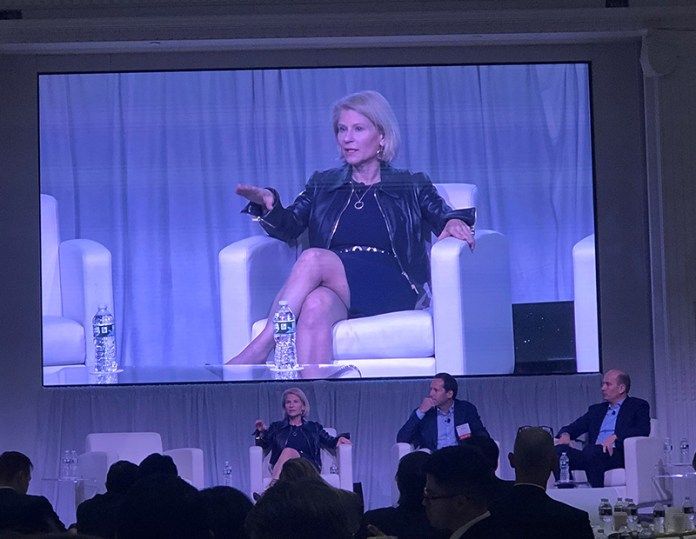REIT Execs Balance Opportunity and Uncertainty
Speakers offered a mix of optimism and caution at the NYU Schack REIT symposium.
REITs find themselves at an unsettling juncture in the real estate cycle.
They are still reaping what Ventas CEO Debra Cafaro called the “incredible snap-back in demand” post-COVID, but they are facing a tsunami of risk factors, including geopolitical turmoil, spiking inflation and interest rate hikes that have already begun to put upward pressure on cap rates. Real estate is still liquid, but at what cost? And could some of that capital seek other alternatives?
“REITs are creatures of the IRS code by charter, but we are also captive to our access to capital because we are dividend payers,” Cafaro remarked.
READ ALSO: How SEC’s Climate Rule Would Impact REITs
Rising uncertainty was one of the consistent themes last week at the annual REIT symposium sponsored by New York University’s Schack Institute of Real Estate. REIT CEOs, advisers and top investors offered their bird’s-eye views of the public and real property markets to a packed audience composed mostly of aspiring real estate executives enrolled in NYU Schack’s real estate programs. Here are some key takeaways from the conference.
Wrong Time to Refinance
Despite a 25-basis point increase in March, interest rates remain historically low. But they won’t stay that way for long because the Fed is determined to keep raising interest rates until it can control inflation.
“The scariest chart in real estate is the long bond,” said David Roth, partner & head of Real Estate Private Equity, Ares Management. “Today our fight is: Will our rents grow faster than rates rise?”
Luckily, REITs and other public companies are much less levered and have pushed maturities out, according to Cedrik Lachance, executive vice president & director of research for Green Street.
ESG Is Everything
Even before the SEC proposed mandating carbon reporting and climate-related disclosures for U.S. public companies two weeks ago, REITs had already elevated environmental, social and governance issues.
“Ten or 15 years ago, it was the last page of our investor book,” noted Kimco Realty Corp. CEO Conor Flynn. “Now it is the first page.”
The SEC will, however, make sustainability more complicated for REITs since it is requiring that companies report not just Scope 1 emissions and Scope 2 emissions, but also Scope 3 emissions, which are the carbon emissions generated by tenants and suppliers and other emissions REITs themselves do not control.
“That’s going to be expensive and a ton of work,” said Mary Hogan-Preusse, senior advisor at real estate venture capital firm Fifth Wall.
All sustainability efforts are costly, and they require a level of expertise not typically found in a real estate organizations. “It is a huge growth area, and there is a huge lack of talent,” said Benjamin Schall, CEO & president of AvalonBay Communities.
Boards Need a Refresh
Beyond sustainability, another major ESG issue which is both a social issue and a governance concern is the need to increase diversity, equity and inclusion. Hogan-Pruess noted she is proud of the strides the industry has made in this area, but, she said, there is a “ton of work” to do to get more DEI into the C-suite.
Sherry Rexroad, executive vice president, CFO, treasurer & assistant secretary at STORE Capital, said greater diversity on boards is critical because it brings new ideas and new requirements for management.
“Diverse boards want diverse workforces, so the refreshment of REIT boards is critical,” she said.

From left, STORE Capital CFO, Secretary & Treasurer Sherry Rexroad; Kimco Realty Corp. CEO Conor Flynn; and AvalonBay Communities CEO & President Benjamin Schall
Activism on the Rise
Governance is a frequent target of activist campaigns, and REITs are entertaining their fair share due to the composition of their shareholder base.
“One-third of ownerships of most REITs is passive,” said Rexroad. “That is higher than the average you see in the S&P.”
Activist campaigns, the panelists seemed to agree, are a healthy feature of the market, though they are expensive and time-consuming and often produce outcomes that would have occurred anyway.
It is important for REIT executives to reach out to passive investors so they can get to know the company before issues arise, Rexroad said. “People voting your shares are voting your governance and not your company,” she noted.
Old Trumps New
“New economy” REITs, such as gaming, cell towers and data centers, are occupying a larger share of the index funds, but traditional REIT sectors still provide the consistency and growth in income that the big indexes are seeking.
One sector that has been particularly reliable is multifamily because it has great same-store comps, offers “breathtakingly” low cap rates, is easy to finance, and delivers a lot of growth, according to Matthew Lustig, chairman of investment banking for North America & head of real estate and lodging at Lazard.
“Even though it is old economy, it works,” Lustig said.
Better Get Tech
While the traditional real estate maxims still apply, REITs are making the most of new technologies in order to streamline their investing and analysis and to respond to tenant demand.
Ron Havner, chairman of the board for Public Storage, PS Business Parks and Shurgard Europe, said the company’s online leasing has gone from 1 percent in 2020 to 50 percent today.
“People want to interact digitally,” Havner remarked. “They want to communicate when they want to, the way they want to.”
Tech Drives Cities
As financial services firms increasingly find their employees can work from anywhere, technology and life science companies are showing voracious appetites for urban office space because cities attract young people, and they are educational centers.
“Companies today only go to places where they can find talent,” said Related Cos. Chairman Stephen Ross, who is attempting to spearhead a “rebirth” in Detroit with the development of a $300 million University of Michigan research center.
Even though financial services and other industries may have permanently moved to hybrid work, it is not hurting office demand that much because companies still want headquarters spaces and employees still want their own desks when they come into the office, according to Boston Properties Chairman Owen Thomas: “Even though our buildings are less occupied, our leasing volume is pre-COVID.”
Go Long on Logistics and Life Sciences
Along with multifamily, logistics and life science office seem to be the “it” property types today in terms of demand and rent growth, and those property types make up 70 percent of Blackstone’s real estate portfolio, according to Kenneth Caplan, the firm’s global co-head of real estate.
“Life science office we love,” said Caplan. “…You can’t do your lab work from home.”
But that is only 70 percent of Blackstone’s U.S., European, and Asian real estate holdings. The other 30 percent includes hotels and retail, and even malls.
As for the growing uncertainty in the capital markets, Caplan seemed less concerned than other speakers. “More volatility can create opportunity,” he said.
Sam Zell, who helped kick off the modern REIT in the early 1990s, offered his assessment of the various property types. Despite unprecedented demand, industrial “may be getting ahead of itself,” said the chairman of Equity Group Investments. Multifamily is increasingly politicized. Class A office is overbuilt because WeWork skewed demand. Retail, meanwhile, offers incredible opportunity in re-purposing.
“The amount of obsolescence in retail is extraordinary,” Zell said. There are going to be great fortunes made in figuring out what to do with that space.”
But today only 30 percent of Equity Group Investments’ assets are in real estate. The company is doing a good deal of backing and adding “professionalism” to private non-real estate family businesses in exchange for controlling stakes, Zell said. And they are keeping their money in the U.S. “You are not getting paid to take the risk offshore,” he said.







You must be logged in to post a comment.